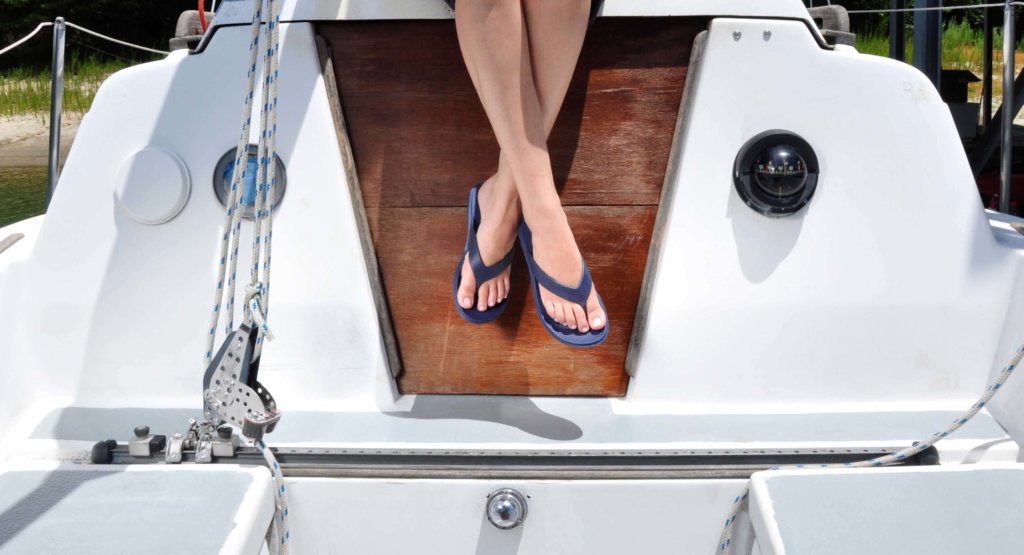When in the late 1970s the Iranian Revolution took hold, shoemaker and businessman Rahim Irvani was forced to leave his home country and start over elsewhere. Rahim brought his skills and experience to the USA, placed his hopes in the country’s business-friendly reputation and built the footwear company Okabashi Brands from the ground up. When other American firms in the industry began outsourcing, Irvani decided to swim against the tide. He kept production in the USA, betting everything on quality and sustainability.
Okabashi has been crafting exceptionally comfortable and distinctively stylish footwear since 1984. Using sustainable products in a closed-loop, environmentally friendly manufacturing process, Okabashi incorporates their vision as a company and their values as a family into every aspect of their operations.
In 2017, Rahim Irvani’s granddaughter, Sara Irvani, took over from her father Bahman as the CEO of the company. Carrying her family’s legacy with confidence, Sara is ensuring the continuation of Okabashi’s success through the third generation and beyond.
Tharawat Magazine sat down with Sara Irvani, CEO of Okabashi, to talk about the importance of values in her family business and the unique vision that keeps her focused on the future.
What is the founding story of Okabashi?
The story of our family’s footwear business begins in Buford, Georgia. Founded in 1872, Buford is a small, quintessentially American town about 40 minutes north of Atlanta. It was one of the major tannery centres in the USA at a time when the economy was very different than it is now.
The town’s footwear industry took off in the 20th century, which also led to a very good semi-pro baseball team being called “The Shoemakers” in the 1930s. However, the industry and the economy changed in 1981 when a fire wiped out all of the shoe factories, and they decided not to rebuild.
Around the same time, my grandfather was running the leading shoe manufacturing business in Iran. In 1979, his company was nationalised by the revolutionary government. It was a difficult time, but he didn’t want to dwell on the past for long. He always had a very forward-looking attitude, and he knew he wanted to start over.
He decided to take his love of shoes to a place that also loved shoes, and, through a combination of coincidences, he ended up in Buford. He could have set up the company in places like Paris or London, but I think that’s the beauty of life – you can never predict where it might take you. His journey to Buford led to the start of Okabashi in 1984. During that time, about 60 per cent of shoes that were worn in the US were also made in the USA. Now, it’s around 1 per cent.
When did the shift to foreign manufacturing begin in the industry?
It began in the 90s. Our competitors started getting less expensive, and our prices were higher because our materials were still being made in the USA. At that time, many companies made the obvious choice of joining the crowd and moved their production to more cost-effective countries. But quality was too important to us.
If you’re manufacturing in a country that requires a full day spent on an aeroplane to get to, is located in an alternate time zone and speaks a different language, you can never have a full grasp on what goes into the materials and how the employees are treated. We wanted to be able to oversee everything that was going on under the company’s name. So, the commitment was made to keep manufacturing in the USA.
It was a decision based on values, which I believe is something family businesses excel at. We continued that way of thinking when we looked at how to make our manufacturing process more sustainable in the 90s. Then, about two years ago, when my father was looking to wind down his involvement in the shoe company, I took on the challenge to promote sustainable local production. So far, we’re making exciting progress with it.
What was your perception of the family business as you were growing up?
I grew up with three brothers. There was always a lot of energy in the house, and we used to talk about the family business at the dining table. It’s what we all live and breathe. As a little girl, I would shadow my father and tinker about in the factory. I thought I was helping him, but I was probably just distracting him and disrupting things.
Even so, I do remember my father asking our opinions on matters he was grappling with in those early days. We were exposed to the mechanics of running the business from a very young age. I always knew that I wanted to follow into business.
Did you steer your education toward business?
I went to a school in England from ages 13 to 18. Then I took undergraduate studies at the University of Virginia, studying philosophy and contemporary ethics with a focus on the philosophy of language, specifically on how we understand metaphors. While I knew I wanted to go into business, I think that it’s also important to stretch your mind and learn how to think creatively. Philosophy was not only very interesting but also extremely useful in ways that I’m only now appreciating.
After that, I went into strategy consulting in Zurich and New York, focusing on innovation and private equity. I remember being on a case where our clients’ sponsor wanted us to change some assumptions in our model to get a specific result. I was shocked. Having studied ethics and philosophy, I was aware that it was not right to change your assumptions based on what you want the results to be.
I’ve seen what happens when you run a company without a strong set of values; it impacts morale at the very least. Business needs to have a soul, values and a purpose.
I realised then that I needed to bolster my education with a Master of Finance. I went to the University of Cambridge, where my father studied. I obtained my Master’s degree and did venture capital from both the investment and the operations perspectives, learning both what works and doesn’t. I’ve seen what happens when you run a company without a strong set of values; it impacts morale at the very least. Business needs to have a soul, values and a purpose. In the States, a lot of people consider corporations to have the same responsibilities as people. Similarly, I think that they need to have strong values as well.
What is your vision and what are the shifts you’ve made so far in your family’s business?
First of all, we examined our values and asked ourselves what being made in the USA really meant. For us, and as for many manufacturing companies, ‘Made in the USA’ has been an emotional pull. We feel that it implies better quality but also a positive impact on people’s lives.
We thought deeper about how an ethical company could function and benefit from local manufacturing. ‘Made in the USA’ means a much lower carbon footprint and adhering to the principles of circular economy, where we can have shoes shipped back to us and follow their entire product lifecycle. You can’t do that when you’re shipping all the way across the ocean and your products end up in a landfill someplace.
A lot of people think that ‘made in the USA’ means ‘expensive,’ and ‘sustainable’ is often associated with ‘unattractive.’ For us, it’s about making sustainability and wellness accessible through the design of our shoes at an affordable price point – that is our vision. We want people to naturally think of Okabashi when it comes to sustainable local footwear options.
It is still uncommon for a young woman to be the CEO of a third-generation family business. What has it been like to take on that role?
Confidence is a very important part of it, but having the support of my family was essential. I credit my husband for saying, ‘Yes, go for it, fulfil your potential.’ Something as simple as that can make all the difference. Gender doesn’t really play a role in my family, but when I look at my interactions with others, I sometimes find a hint of surprise that a young woman is taking on such a challenge and responsibility. Instead of being put off by that reaction, I try to use it as a start to a positive conversation.
With such an interesting business model, what have you got in mind for the future of Okabashi?
Our goal is to consistently grow the team and direct social impact. We have already sold over 35 million pairs of shoes. I believe we can change people’s perception of products that are responsibly made in the USA. I’ll consider myself successful if we are able to do that and if I am able to provide meaningful opportunities for my team and around my factory.
Okabashi has always been a family business, and it’s hard to imagine it as anything different. I grew up in and around the factory, and I would like to offer that opportunity to my future children as well. We have recently launched a brand called Third Oak – a reference to the third generation of shoemakers – and it would be amazing to have a ‘Fourth Oak’ brand one day.

